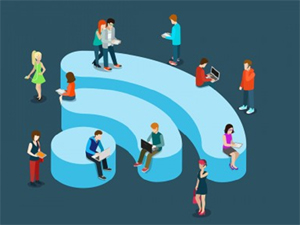



Date:14/12/16
 A team of University of Washington computer scientists and electrical engineers have demonstrated that it’s possible to generate Wi-Fi transmissions using 10,000 times less power than conventional methods. “Passive Wi-Fi” as the team calls it, is compatible with current smartphones and routers.
A team of University of Washington computer scientists and electrical engineers have demonstrated that it’s possible to generate Wi-Fi transmissions using 10,000 times less power than conventional methods. “Passive Wi-Fi” as the team calls it, is compatible with current smartphones and routers.
The new Passive Wi-Fi system also consumes 1,000 times less power than existing energy-efficient wireless communication platforms, such as Bluetooth Low Energy and Zigbee. A paper describing those results will be presented in March at the 13th USENIX Symposium on Networked Systems Design and Implementation.
According to a video describing Passive Wi-Fi, traditional Wi-Fi radios consume a lot of power mainly because of the analogue radio frequency (RF). In order to reduce power consumption of Wi-Fi radios in smartphones and digital devices, the Passive Wi-Fi only uses the digital baseband while the analogue RF band is delegated to a single plugged-in device.
Passive Wi-Fi can for the first time transmit Wi-Fi signals at bit rates of up to 11 megabits per second that can be decoded on any of the billions of devices with Wi-Fi connectivity. These speeds are lower than the maximum Wi-Fi speeds but 11 times higher than Bluetooth.
Aside from saving battery life on today’s devices, wireless communication that uses almost no power will help enable an “Internet of Things” reality where household devices and wearable sensors can communicate using Wi-Fi without worrying about power.
The team has managed to achieve download speeds of up to 11Mbps which falls in line with most LTE download speeds. However, the team is now working on increasing the throughput.
The team say that this new technology will allow for new kinds of communications that was not possible before due to the power requirements of current Wi-Fi systems.
New ‘Passive Wi-Fi’ uses 10,000 times less power than traditional Wi-Fi
 A team of University of Washington computer scientists and electrical engineers have demonstrated that it’s possible to generate Wi-Fi transmissions using 10,000 times less power than conventional methods. “Passive Wi-Fi” as the team calls it, is compatible with current smartphones and routers.
A team of University of Washington computer scientists and electrical engineers have demonstrated that it’s possible to generate Wi-Fi transmissions using 10,000 times less power than conventional methods. “Passive Wi-Fi” as the team calls it, is compatible with current smartphones and routers.The new Passive Wi-Fi system also consumes 1,000 times less power than existing energy-efficient wireless communication platforms, such as Bluetooth Low Energy and Zigbee. A paper describing those results will be presented in March at the 13th USENIX Symposium on Networked Systems Design and Implementation.
According to a video describing Passive Wi-Fi, traditional Wi-Fi radios consume a lot of power mainly because of the analogue radio frequency (RF). In order to reduce power consumption of Wi-Fi radios in smartphones and digital devices, the Passive Wi-Fi only uses the digital baseband while the analogue RF band is delegated to a single plugged-in device.
Passive Wi-Fi can for the first time transmit Wi-Fi signals at bit rates of up to 11 megabits per second that can be decoded on any of the billions of devices with Wi-Fi connectivity. These speeds are lower than the maximum Wi-Fi speeds but 11 times higher than Bluetooth.
Aside from saving battery life on today’s devices, wireless communication that uses almost no power will help enable an “Internet of Things” reality where household devices and wearable sensors can communicate using Wi-Fi without worrying about power.
The team has managed to achieve download speeds of up to 11Mbps which falls in line with most LTE download speeds. However, the team is now working on increasing the throughput.
The team say that this new technology will allow for new kinds of communications that was not possible before due to the power requirements of current Wi-Fi systems.
Views: 634
©ictnews.az. All rights reserved.Similar news
- The mobile sector continues its lead
- Facebook counted 600 million active users
- Cell phone testing laboratory is planned to be built in Azerbaijan
- Tablets and riders outfitted quickly with 3G/4G modems
- The number of digital TV channels will double to 24 units
- Tax proposal in China gets massive online feedback
- Malaysia to implement biometric system at all entry points
- Korea to build Green Technology Centre
- Cisco Poised to Help China Keep an Eye on Its Citizens
- 3G speed in Azerbaijan is higher than in UK
- Government of Canada Announces Investment in Green Innovation for Canada
- Electric cars in Azerbaijan
- Dominican Republic Govt Issues Cashless Benefits
- Spain raises €1.65bn from spectrum auction
- Camden Council boosts mobile security





















